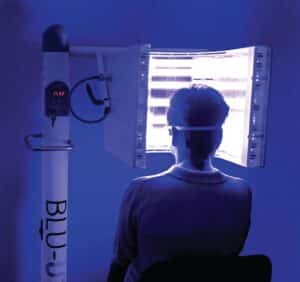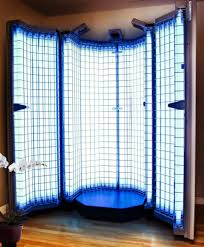At Grand Strand Dermatology, we are committed to offering innovative and effective cancer treatments. We are one of the few in Myrtle Beach and surrounding areas that offer two types of Light Therapy in our South Office for current patients, representing a cutting-edge approach. Photodynamic Therapy (PDT) and Phototherapy are used to treat a variety of skin conditions. If you are interested in learning if the this is a treatment for you please call (843)215-1100 to schedule an appointment with your provider. If you are not a current patient please call (843)215-1100 and schedule a new patient appointment.
Therapies
Photodynamic therapy (PDT) is a treatment that uses a special topical drug, called Ameluz which is a photosensitizing agent, along with light to kill pre-cancerous and cancer cells. The topical only works after it has been activated or “turned on” by certain kinds of light.
Photodynamic Therapy involves three key steps:
- The administration of the photosensitizing agent is done in the office by a medical professional.
- A wait period predetermined by your provider, can be anywhere from 1 hour to 3 hours. Allowing the agent to concentrate on the cancer cells.
- Exposure to a specific wavelength of light for 16 minutes 40 seconds. This light activation causes the agent to produce a form of oxygen that destroys nearby pre-cancerous and cancer cells (with minimal impact on surrounding healthy tissue).
- After the initial treatment patients will come back for an additional treatment in 6-8 weeks.
Pros and cons of PDT
Studies have shown that PDT can work as well as surgery or radiation therapy in treating certain kinds of cancers and pre-cancers. It has some advantages, such as:
- It has no long-term side effects when used properly.
- It’s less invasive than surgery.
- It usually takes only a short time and is most often done as an outpatient procedure.
- It can be targeted very precisely.
- Unlike radiation, PDT can be repeated many times at the same site if needed.
- There’s usually little or no scarring after the site heals.
- It often costs less than other cancer treatments.
But PDT has limits, too:
- PDT can only treat areas where light can reach. This means it’s mainly used to treat problems on or just under the skin, or in the lining of organs that can be reached with a light source. Because light can’t travel very far through body tissues, PDT can’t be used to treat large cancers or cancers that have grown deeply into the skin or other organs.
- PDT can’t be used to treat cancers that have spread to many places.
- The drugs used for PDT can leave people very sensitive to light for some time. Special precautions must be taken after the drugs are put in or on the body.
- PDT can’t be used in people who have certain blood diseases.
(click the Picture for more)
Phototherapy, or light therapy, is typically prescribed by a dermatologist. Phototherapy involves exposing the skin to ultraviolet (UV) light on a regular basis and under medical supervision for a set amount of time. Treatments can be done in a health care provider's office, a clinic, or at home with a phototherapy unit. The key to success with light therapy is consistency.
UV light shuts down immune system cells in the skin. It can help with skin conditions that are caused by an overreaction of the immune system. Skin conditions that are treated with phototherapy include:
- Psoriasis — a skin disorder that causes red, silvery, scaly patches on the skin
- Eczema — an itchy, red skin condition, or dermatitis due to allergies
- Mycosis fungoides — a type of lymphoma confined to the skin
- Vitiligo — a skin disorder where normal skin pigment is lost due to destruction of pigment-producing cells by the immune system
Preparing for Treatment
You will be asked to remove any clothes that covers the skin being treated. Areas that do not need treatment should be covered and protected as much as possible. Some safety steps include:
- Sunscreen to protect your neck, lips, and the backs of your hands
- Special glasses or goggles to protect your eyes from UV light
- Cover for genitals in men
- Sunscreen for nipples and areola in women
Make sure to inform your doctor about any medications that you are currently taking. Some medications, including over-the-counter medication, can increase the risk of side effects.
(click the picture for more)




